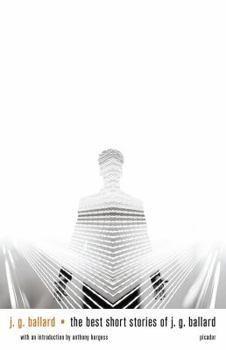The Best Short Stories of J. G. Ballard
Select Format
Select Condition 
Book Overview
First published in 1978, this collection of nineteen of J. G. Ballard's best short stories is as timely and informed as ever. This collection includes "The Garden of Time," the inspiration for the 2024 Met Gala-fashion's biggest night.
His tales of the human psyche and its relationship to nature and technology, as viewed through a strong microscope, were eerily prescient and now provide greater perspective on our computer-dominated culture. Ballard's voice and vision have long served as a font of inspiration for today's cyber-punks, the authors and futurists who brought the information age into the mainstream.Format:Paperback
Language:English
ISBN:0312278446
ISBN13:9780312278441
Release Date:July 2001
Publisher:St. Martins Press-3PL
Length:320 Pages
Weight:0.65 lbs.
Dimensions:0.9" x 5.5" x 8.4"
Customer Reviews
5 ratings
Great collection of short stories
Published by Thriftbooks.com User , 19 years ago
All the stories here are great. I really liked Manhole,the Cloud-sculptors of Coral D, and Thirteen for Centaurus. Most of the stories here really show Ballards visionary view of the world and its future.
The Best Short Stories of J. G. Ballard
Published by Thriftbooks.com User , 20 years ago
I am much displeased to see that the current version of this story collection features such lackluster cover art. My original copy features a breathtaking portrait of a crowd and some cars in the desert, dwarfed by a towering pink collosus, while hand gliders dots the sky above and an enormous unicorn appears in the clouds. But what's most amazing is that this isn't just whimsy on the artist's part; it's actually a scene from one of Ballard's stories. That's the thing about Ballard. To him the idea that a ragtag but energetic crew of pilots might create enormous sculptures out of clouds in the desrt sky wasn't just possible, it seemed perfectly natural. His imagination ran to places that most science fiction authors couldn't even conceive, and once there it plopped into an armchair and started spinning a story that readers won't ever forget. In Ballard's view, the human race is in decline. It's not because of human weakness or bad political decisions, it's just in the nature of the universe that we'll fade out, and (possibly) make way for something else. In "Concentration City", we live in a gigantic metorpolis stretching out in every direction with no open spaces. One man sets out on a quest to reach the city's edge. Along the way, he finds troubling signs of encroaching urban decay. But if nothing other than the city exists, does this spell the end of the world? In "The Deep End", technology sets of a chain reaction of unintended consequences, leading to Earth's oceans running dry. Most people depart for other planets, but one crotchety old-timer insists on staying behind, hoping to protect the world's last fish. Other stories more directly tackle social issues. Some folks believe that modern society is too obsessed with schedules and deadlines. In "Chronopolis" we respond by outlawing clocks and watches. But as always there will be rebels who refuse to accept the revolution. Which side will win in the end? "Billennium" takes on overpopulation, while "Thirteen for Centaurus" looks at scientific ethics while also considering how easy it is to fool people ... or then again maybe not. Among the most memorable images in this collection is "The Drowned Giant". The title is self explanatory: a giant washes up on shore near a major city. Ballard worries less about where it comes from, more about how we'll react to seeing it. While the unnamed narrator reflects on the giant's mythological appearance, the body ends up getting chopped up and used as fertilizer, while the bones decorate doorways around the city. You can try tagging metaphorical meaning to that ending if you wish, but to Ballard it was just one analysis of how modern society functions, which isn't too well.
Food for Thought
Published by Thriftbooks.com User , 24 years ago
Ballard is one of the great "conceptualizers" of modern literature. The premises of his stories are the most immediately striking thing about them. Sometimes the story doesn't live up to the expectations he creates, but this is probably because he sets the bar so high.In any case, whether a Ballard story is a total or only a partial success, it invariably provides plenty of food for thought. Three of them--"The Overloaded Man", "The Drowned Giant", and "The Garden of Time"--rank among my all-time favorites for their perfect fusion of speculative and mythic qualities. The more technology-based stories ("Concentration City", "The Voices of Time") are more interesting for their ideas than their execution.In the introduction to this volume, Anthony Burgess hits on the central importance of Ballard's work: "Ballard considers that the kind of limitation that most contemporary fiction accepts is immoral... Language exists less to record the actual than to liberate the imagination." If you agree, buy this book.
Some of the best short fiction
Published by Thriftbooks.com User , 24 years ago
This is some of the best short fiction ever written. A friend of mine lent me this book. I've read a lot more J.G Ballard because I loved this book so much, but have not enjoyed Ballards other work as much. Most of the stories deal with mans struggle to cope - with technolgy, with fear, with relationships with change etc. There's a few dud stories but most are home runs.
Ballard's short stories are superior to the novels
Published by Thriftbooks.com User , 24 years ago
In my humble opinion, Ballard is at his best in the short story format. "Now: Zero", "A Question of Re-entry", "The Venus Hunters" and "The Lost Leonardo" are among my favourite short stories of all time. Poe wrote that short stories are in many ways preferable to novels, since the aesthetic effect is more concentrated, and generally absorbed at one sitting. This applies particularly to Ballard I think.






